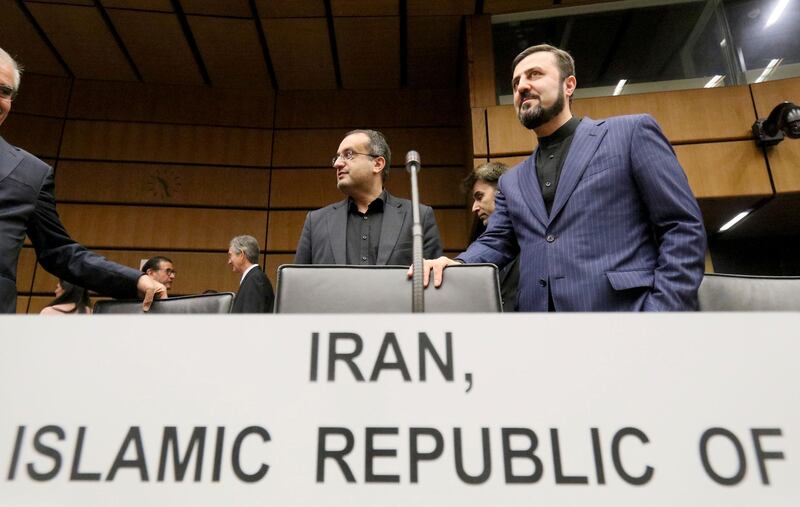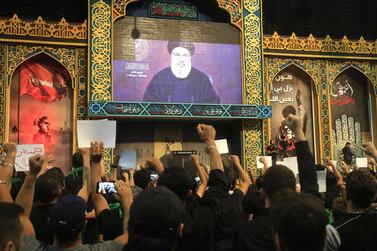Iran is installing advanced centrifuges to produce enriched uranium, in contravention of the nuclear deal signed with world powers in 2015, the UN's nuclear watchdog said on Monday.
The International Atomic Energy Agency said that 56 centrifuges on September 7 were either installed or being installed at Iran's Natanz plant.
Officials from the IAEA said that Iran told them of plans to "produce enriched uranium with advanced centrifuges". This would breach the ban imposed by the nuclear deal.
"All of the installed centrifuges had been prepared for testing with UF6 [uranium hexafluoride], although none of them were being tested with UF6 on September 7 and 8, 2019," the agency said.
It said Tehran informed it in a letter on Sunday that it would recommission two research and development lines to accommodate two cascades of centrifuges.
Cascades are lines of centrifuges that create greater enrichment.
Samples collected by the IAEA in Tehran showed traces of uranium that Iran has yet to explain, diplomats said recently.
The IAEA is investigating the particles' origin and has asked Iran to explain.
But Tehran has not done so, the diplomats said, stoking even greater tension between Washington and Tehran.
The agency, which is policing the nuclear deal, had inspected a site in Tehran that Israel's Prime Minister, Benjamin Netanyahu, called a "secret atomic warehouse".
The IAEA says it carries out such inspections "only when necessary" and environmental samples were sent off for analysis.
In a speech a year ago, Mr Netanyahu, who vehemently opposed the nuclear deal, called on the agency to visit the site immediately.
He said it contained 15 kilograms of unspecified radioactive material that had since been removed.
Israeli and US media have since reported that the samples turned up traces of radioactive material or matter in the same vague language used by Mr Netanyahu.
But those traces were of uranium, the diplomats said. One said the uranium was not enriched to a level anywhere close to that needed for weapons.
"There are lots of possible explanations," the diplomat said.
But since Iran has not yet given any to the IAEA it is hard to verify the particles' origin, and it is also not clear whether the traces are remnants of material or activities that predate the landmark 2015 deal or more recent.
The IAEA did not respond to a request for comment. Iranian officials were not available to comment.
"The regime must be held to account and not given a free pass," Israeli ambassador to the UN Danny Danon said on Twitter.
Mr Netanyahu said on Facebook before an election next week that: "I know the issue is being handled by the IAEA. I do not intend to discuss this today.
"It's very possible that I will have something to say about it tomorrow.
"But it is certainly an important issue. Let me tell you, it's the most important issue as far as our future is concerned. And I am not relenting for a moment."
The 2015 nuclear deal imposed tight restrictions on Iran's atomic programme in exchange for sanctions relief.
The IAEA and US intelligence services believe Iran had a nuclear weapons programme that it ended more than a decade before the deal. Iran says its nuclear ambitions have always been peaceful.
Hawks including Mr Netanyahu say Tehran has proven in the past that it can never be trusted.
Iran's earlier secrecy might explain why uranium traces were found at a location that was never declared to the IAEA.
The IAEA takes environmental samples because they can pick up telltale particles even long after material has been removed from a site.
Uranium traces could indicate the former presence of equipment or material somehow connected to those particles.
Cornel Feruta, the IAEA's acting director general, met Iranian officials on Sunday.
The agency later said Mr Feruta "stressed that these interactions require full and timely co-operation by Iran".
The US, which was pulled out of the nuclear deal last year by President Donald Trump, is trying to force Iran to negotiate a more sweeping agreement, covering its ballistic missiles and regional behaviour.
Iran says it will not negotiate until US sanctions are lifted, which France is trying to broker.
In the meantime, Iran is breaching the deal's restrictions on its nuclear activities step by step in response to US "economic warfare".
A quarterly IAEA report issued a week ago did not mention the sample results because inspection-related matters are highly confidential. But it did say Iran's co-operation could be improved.
It is far from the first time that Iran has delayed its interactions with the IAEA. The agency has made similar calls in previous reports, in relation to promptly granting access for inspections.
The IAEA combs through countries' statements on their nuclear activities and materials, checking them and when necessary seeking further explanations before reaching a conclusion, which can take a long time.
The process of seeking an explanation from Iran has lasted two months, the IAEA's protection division chief told member states on Thursday.
But he described what it was seeking an answer to far more generally as questions about Iran's declaration of nuclear material and activities, since the details are confidential.
A senior diplomat said that the standoff was not unique to Iran: "Depending on the engagement it can take two months, six months."
That does not mean all member states will be happy to wait.
US National Security Adviser John Bolton tweeted on Saturday that Mr Feruta was going to Iran "as the IAEA informed its board that Iran may be concealing nuclear material and or activities".
"We join with other IAEA board member states eager to get a full report as soon as possible," Mr Bolton said.
The IAEA's 35-nation board of governors will hold a week-long quarterly meeting starting on Monday.







